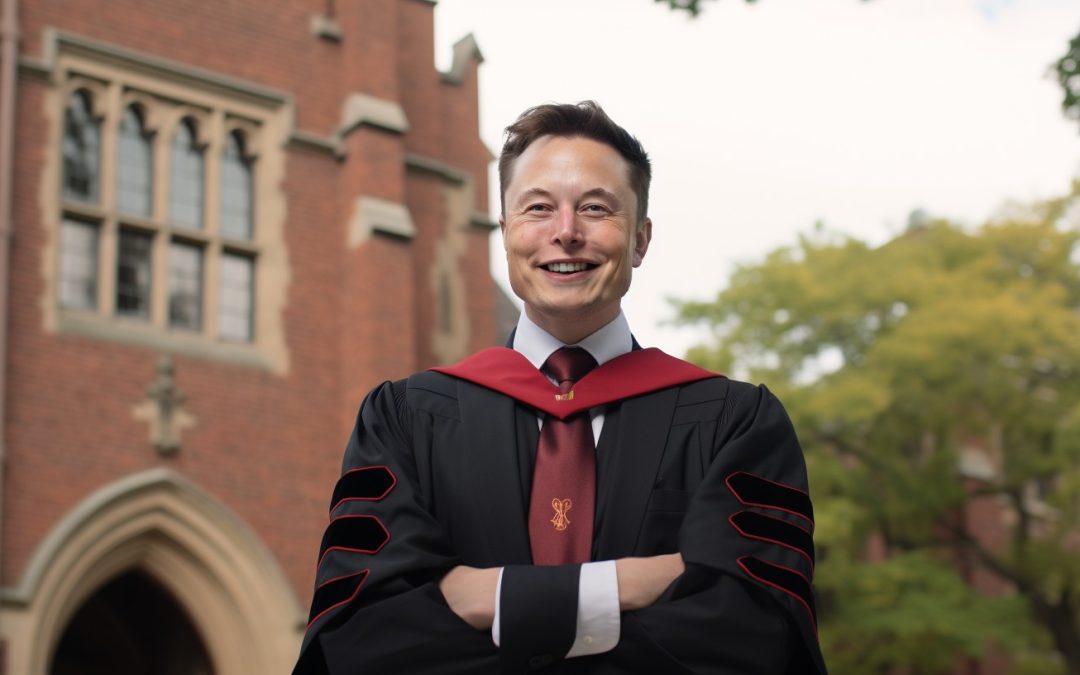
What did Elon Musk study in college? Our researchers tell all
Elon Musk, the enigmatic entrepreneur and visionary behind companies like Tesla and SpaceX, is a name that resonates globally. His achievements in the realms of electric vehicles, space exploration, and renewable energy have earned him a place among the most influential figures of our time.
However, despite his immense success, there is a lot of curiosity that persists about his educational background. What did Elon Musk study in college, and how did his academic pursuits shape the trajectory of his remarkable career?
Elon Musk’s early years
Before we answer the commonly-asked question – What did Elon Musk study in college? – it’s crucial to explore the foundation of who Elon Musk is. Elon Musk was born on June 28, 1971, in Pretoria, South Africa. From a young age, Musk displayed a keen interest in technology and innovation. His entrepreneurial spirit emerged early when, at the age of 12, he sold a homemade video game called “Blastar.” This early venture hinted at the future endeavors that would define Musk’s career.
After completing his primary education in South Africa, Musk moved to Canada to attend Queen’s University at the age of 17. His journey into higher education marked the beginning of a path that would lead him to the forefront of the technology and business worlds.
So, what did Elon Musk study in college?
Queen’s University
At Queen’s University in Kingston, Ontario, Elon Musk pursued a dual bachelor’s degree in Physics and Economics. This combination of scientific and economic disciplines showcased Musk’s multidimensional approach to problem-solving and innovation. The physics component of his education provided him with a solid foundation in the fundamental principles of the natural world, while the study of economics equipped him with insights into the dynamics of markets and business.
Musk’s time at Queen’s University was marked by a voracious appetite for knowledge and an intense work ethic. He was known to immerse himself in his studies, often spending long hours in the library and engaging in discussions with professors and fellow students. The fusion of physics and economics laid the groundwork for Musk’s ability to navigate complex technical challenges while understanding the economic viability of his ventures.
Elon Musk’s transition to the United States
After completing his bachelor’s degree at Queen’s University, Musk set his sights on the United States. In 1995, he entered the prestigious Stanford University in California for his Ph.D. However, Musk’s time at Stanford was relatively short-lived, as he left the program just two days later. His decision to drop out of Stanford is often cited as a pivotal moment that set him on the path to entrepreneurship.
Rather than continuing his academic pursuits, Musk was drawn to the burgeoning world of the internet and business. His entrepreneurial instincts led him to co-found Zip2, a software company that aimed to provide business directories and maps for newspapers. The venture was a success, and Musk’s share of the sale of Zip2 provided him with the capital to embark on his next ventures.
X.com and the birth of PayPal
In 1999, Musk founded X.com, an online payment company. X.com aimed to revolutionize online financial transactions, and this venture marked Musk’s entry into the financial technology sector. The company’s vision and innovative approach attracted attention, and in 2000, X.com merged with Confinity, a company known for its money-transfer service, and became known as PayPal.
Elon Musk’s role in the success of PayPal solidified his reputation as a visionary entrepreneur. The experience of founding and leading a company in the rapidly evolving field of online payments further honed Musk’s business acumen and strategic thinking.
A shift to space and electric vehicles
With the sale of PayPal to eBay in 2002, Elon Musk found himself with a considerable fortune and the freedom to pursue his ambitious goals. His interests expanded beyond the digital realm, leading him to two industries that would define the next phase of his career: space exploration and sustainable transportation.
In 2002, Musk founded SpaceX to reduce space transportation costs and eventually enable the colonization of Mars. Simultaneously, he became involved in the electric vehicle industry, co-founding Tesla Motors (now Tesla, Inc.) in 2003. These ventures marked a departure from Musk’s formal education in physics and economics, showcasing his ability to pivot and apply his skills across diverse domains.
The essence of Musk’s education
Elon Musk’s educational journey, from studying physics and economics at Queen’s University to dropping out of a Ph.D. program at Stanford, reflects a distinctive blend of scientific understanding and business acumen. While Musk did not follow a traditional academic path to its completion, his foundational knowledge in physics and economics undoubtedly contributed to his success as an entrepreneur and innovator.
Musk’s emphasis on self-directed learning and hands-on experience played a crucial role in shaping his mindset and leadership style. His early exposure to programming, coupled with a relentless pursuit of knowledge, allowed him to bridge the gap between theoretical understanding and practical application. Musk’s ability to navigate complex technical challenges is rooted in his foundational education, which provided him with the analytical skills and problem-solving mindset necessary for success.
These days, entrepreneurs who are pursuing self-directed learning online stand a better chance of passing certification exams with ExamLabs.
The importance of multidisciplinary learning
Elon Musk’s story underscores the value of multidisciplinary learning. The intersection of physics and economics in his undergraduate studies laid the groundwork for his ability to navigate the complexities of both technical and business realms. This multidimensional approach has been a recurring theme in Musk’s career. This recurrence is evident as he seamlessly transitions between industries, from online payments to space exploration and electric vehicles.
Musk’s ventures are a testament to the interconnectedness of knowledge and the power of applying insights from diverse fields. The ability to draw on principles from physics, economics, and other disciplines has been a key factor in Musk’s success in tackling grand challenges and disrupting established industries.
Musk’s influence on education and innovation
Elon Musk is not only changing the landscape of industries such as space exploration and electric vehicles but also leaving an indelible mark on the realms of education and innovation. His vision extends beyond the confines of corporate boardrooms, reaching into the very fabric of how we educate and innovate for the future.
1. Advocacy for STEM education
One of Elon Musk’s most significant contributions to education lies in his fervent advocacy for STEM (science, technology, engineering, and mathematics) education. Recognizing the pivotal role these disciplines play in technological advancements, Musk has consistently emphasized the need for a robust foundation in STEM fields. His belief in the transformative power of these subjects is evident in his philanthropic endeavors, notably through the Musk Foundation.
The Musk Foundation, established in 2002, has been instrumental in supporting educational initiatives that promote STEM education. By funding programs, scholarships, and resources, Musk aims to inspire the next generation of scientists, engineers, and innovators. The foundation’s impact is not limited to the United States; it extends globally, reflecting Musk’s commitment to fostering talent on a global scale.
2. Ad Astra: Musk’s experimental school
In 2014, Elon Musk took a bold step toward reshaping the education landscape by establishing Ad Astra, a small experimental school for his children. Ad Astra, meaning “to the stars” in Latin, embodies Musk’s forward-thinking approach to education. The school aims to provide a unique and personalized learning experience, deviating from traditional education models.
Ad Astra, now known as Astra Nova, emphasizes problem-solving, critical thinking, and hands-on projects. The curriculum focuses on real-world applications of knowledge, mirroring Musk’s own belief in the importance of practical skills and the ability to address complex challenges. While the school is currently private and primarily serves Musk’s family, its experimental nature sparks conversations about the potential evolution of mainstream education.
3. The Musk University
Elon Musk has also expressed his discontent with the traditional higher education system, citing its inefficiencies and the often exorbitant costs associated with obtaining a degree. In 2020, Musk provocatively tweeted about his intention to create a new university, stating, “A new kind of educational entity is going to be created that is more effective at teaching problem-solving and less about indoctrination.”
The details of Musk’s proposed university remain speculative. Even so, the mere idea highlights his dissatisfaction with the status quo and his willingness to challenge established norms. Musk’s potential foray into higher education could signal a shift towards more pragmatic, skills-oriented learning experiences that align with the demands of a rapidly evolving job market.
4. Innovation as a way of life
Elon Musk’s influence on innovation extends far beyond the products and technologies developed by his companies. Musk embodies a mindset that embraces risk, disruption, and a relentless pursuit of ambitious goals. His approach to innovation emphasizes the importance of thinking big, challenging conventions, and embracing failure as an inherent part of the learning process.
Musk’s companies, such as SpaceX and Tesla, are at the forefront of technological innovation, pushing the boundaries of what is considered possible. Whether it’s the development of reusable rocket technology or the mass production of electric vehicles, Musk’s ventures have reshaped industries and inspired a new era of technological advancement.
5. Inspiration for aspiring entrepreneurs
Elon Musk’s journey from a college dropout to a billionaire entrepreneur serves as a powerful source of inspiration for aspiring innovators. Musk’s story highlights the importance of passion, perseverance, and a willingness to take risks. His ability to pivot between industries showcases the versatility that defines a modern entrepreneur. This is evident in his transition from online payments to space exploration and electric vehicles,
Musk’s influence extends into the entrepreneurial ecosystem. This influence is evident through initiatives like the SpaceX Hyperloop Pod Competition. The competition invites university students to design and build high-speed transportation pods. By fostering competitions and challenges, Musk actively engages with the next generation of innovators. In this way, he provides a platform for hands-on experience and real-world problem-solving.
Conclusion
Now that you’ve read this article, you can easily answer the common question – What did Elon Musk study in college? In unraveling the mystery of what Elon Musk studied in college, we discover a narrative that goes beyond the confines of traditional education. Musk’s journey started with a study of physics and economics at Queen’s University to the founding of revolutionary companies like SpaceX and Tesla. This journey exemplifies the power of interdisciplinary learning, entrepreneurial spirit, and a relentless pursuit of knowledge.
Elon Musk’s story challenges conventional notions of success and education. It encourages individuals to embrace diverse interests, take calculated risks, and pursue their passions with unwavering determination. Musk’s impact extends beyond the industries he has transformed. It serves as a testament to the idea that education is a lifelong journey. It also reflects the reality that success often lies at the intersection of different disciplines.
FAQs
Has Elon Musk expressed any dissatisfaction with higher education?
Yes, Elon Musk has expressed dissatisfaction with the traditional higher education system, citing inefficiencies and high costs. He has hinted at the possibility of creating a new kind of university. This university stands out because it focuses on effective problem-solving rather than indoctrination.
What is Ad Astra, and how does it relate to Elon Musk’s views on education?
Ad Astra is an experimental school founded by Elon Musk in 2014 for his children. The school, now known as Astra Nova, emphasizes problem-solving, critical thinking, and hands-on projects. The very existence of Astra Nova reflects Musk’s dissatisfaction with traditional education models. It also demonstrates his vision for a more personalized and practical learning experience.
How did Elon Musk’s educational background contribute to his success?
Musk’s educational background provided him with analytical skills. It also gave him a problem-solving mindset and a deep understanding of both scientific and economic principles. This foundation played a crucial role in his ability to navigate various industries and tackle grand challenges.
Did Elon Musk have any other formal education after leaving Stanford?
Elon Musk did not pursue any other formal education after leaving Stanford. Instead, he delved into the world of entrepreneurship, co-founding Zip2 and later founding X.com, which would eventually become PayPal.
How did Elon Musk’s college education influence his career?
Musk’s college education laid the groundwork for his career. It gave him the ability to navigate complex technical challenges while understanding the economic viability of his ventures. The fusion of Physics and Economics provided him with a unique skill set. Ultimately, this skill set contributed to his success as an entrepreneur and innovator.
What did Elon Musk study at Stanford University?
Elon Musk enrolled at Stanford University for a Ph.D. However, Musk did not complete his Ph.D. at Stanford University. Instead, he left the program after just two days to pursue entrepreneurial ventures in the emerging field of the Internet.
What did Elon Musk study and why did he choose those subjects?
Elon Musk’s choice to study Physics and Economics reflected his multidimensional approach to problem-solving and innovation. The combination of a scientific foundation and an understanding of economic principles provided him with a well-rounded education for his future endeavors.
How Pressfarm can help your business to succeed
Let’s face it – while we can now answer the question, “What did Elon Musk study in college,” we can’t all be Musk. If you’re lucky, you can replicate his exact business model. With this model, you could potentially build a massively successful business. However, even Musk needed help with marketing and PR from time to time.
Are you part of a startup that is launching a new product or service? Just imagine how amazing it would be to let someone else worry about generating publicity for your startup, while you focus on perfecting your product. With a team of professionals who have experience working with brands from different industries, Pressfarm can do that for you!
Pressfarm provides personalized public relations services that will help you tell a memorable brand story that will capture media attention and inspire your target audience. We have experience writing press releases that will win journalists over and feature articles that will excite your target audience. We’re also skilled at designing media kits that showcase the unique personality of each brand.
On top of taking care of your content creation, we’re committed to helping you find the perfect journalists to cover your story. For this reason, we give all our clients access to our media database of over 1 million journalists across different niches. With this database, you can forget about having to comb the Internet for journalists every time you have a story to pitch. Check out our packages and let us help you tell a brand story that moves your target audience and inspires action.


